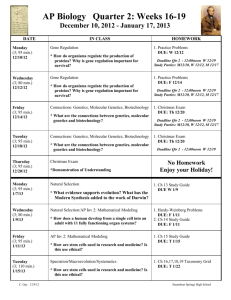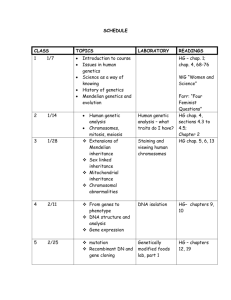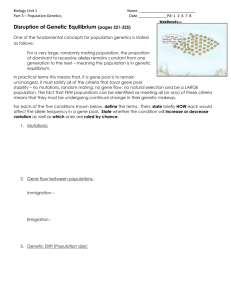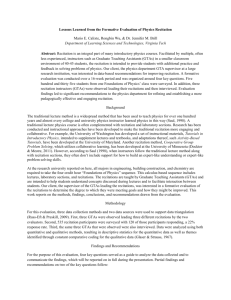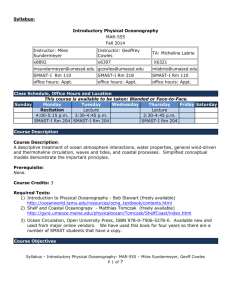Tuesday, Thursday 12:30-01.45 Genome Science 200
advertisement
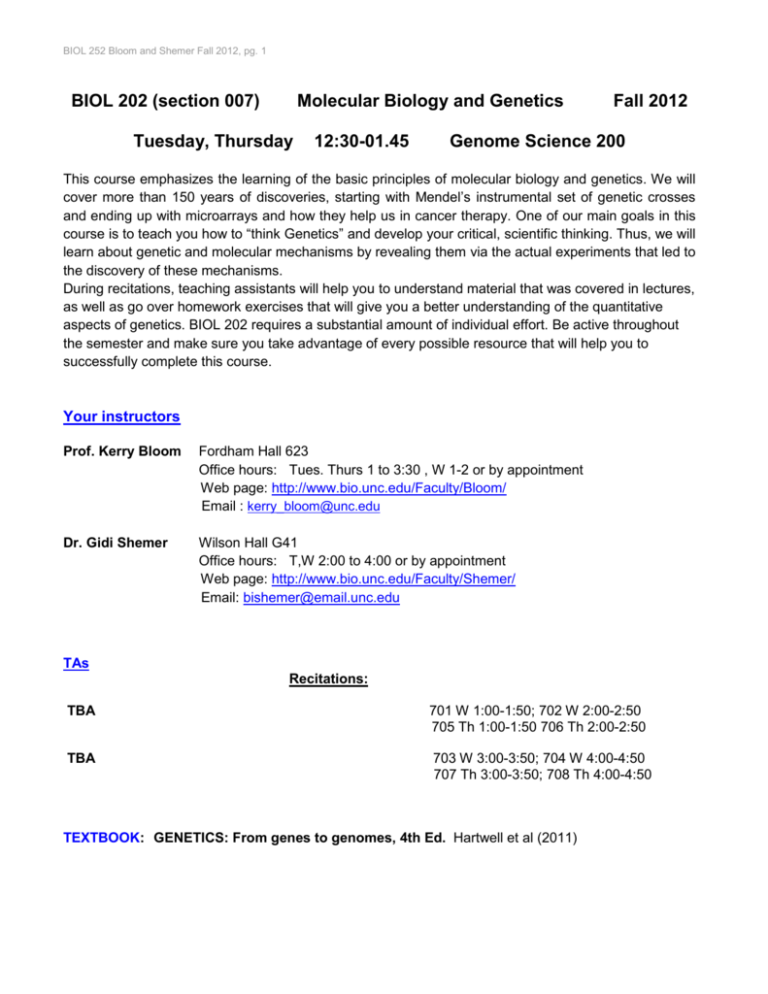
BIOL 252 Bloom and Shemer Fall 2012, pg. 1 BIOL 202 (section 007) Molecular Biology and Genetics Tuesday, Thursday 12:30-01.45 Fall 2012 Genome Science 200 This course emphasizes the learning of the basic principles of molecular biology and genetics. We will cover more than 150 years of discoveries, starting with Mendel’s instrumental set of genetic crosses and ending up with microarrays and how they help us in cancer therapy. One of our main goals in this course is to teach you how to “think Genetics” and develop your critical, scientific thinking. Thus, we will learn about genetic and molecular mechanisms by revealing them via the actual experiments that led to the discovery of these mechanisms. During recitations, teaching assistants will help you to understand material that was covered in lectures, as well as go over homework exercises that will give you a better understanding of the quantitative aspects of genetics. BIOL 202 requires a substantial amount of individual effort. Be active throughout the semester and make sure you take advantage of every possible resource that will help you to successfully complete this course. Your instructors Prof. Kerry Bloom Fordham Hall 623 Office hours: Tues. Thurs 1 to 3:30 , W 1-2 or by appointment Web page: http://www.bio.unc.edu/Faculty/Bloom/ Email : kerry_bloom@unc.edu Dr. Gidi Shemer Wilson Hall G41 Office hours: T,W 2:00 to 4:00 or by appointment Web page: http://www.bio.unc.edu/Faculty/Shemer/ Email: bishemer@email.unc.edu TAs Recitations: TBA 701 W 1:00-1:50; 702 W 2:00-2:50 705 Th 1:00-1:50 706 Th 2:00-2:50 TBA 703 W 3:00-3:50; 704 W 4:00-4:50 707 Th 3:00-3:50; 708 Th 4:00-4:50 TEXTBOOK: GENETICS: From genes to genomes, 4th Ed. Hartwell et al (2011) BIOL 252 Bloom and Shemer Fall 2012, pg. 2 SCHEDULE 1. Aug 21 Introduction: Genes, Genomes and Genetic Analysis (KB)- Ch1 2. Aug 23 DNA: the Molecule of Heredity (KB) Ch6 (6.1-6.3) 3. Aug 28 How traits are transmitted: Mendelian Inheritance (KB) Ch 2 4. Aug 30 How traits are transmitted: Extensions to Mendel (KB) Ch3 5. Sep 04 The chromosome theory of Inheritance (KB) Ch 4 6. Sep 06 Genetic Linkage and Chromosome Mapping (KB) Ch 5 7. Sep 11 Molecular Biology of DNA Replication (EY) Ch 6 Recitation: Introduction Recitation: Genetic tests activity 5 Recitation: Mitosis- activity 3 Sep 13 Exam 1 (Covers lectures # 1-6 inclusive) 8. Sep 18 Molecular Biology of DNA Recombination and Exchange (KB) Ch 6 9. Sep 20 Molecular Mechanisms of Mutation and DNA Repair (KB) Ch7 Recitation: PCR- activity 1 10. Sep 25 Mapping the Human Genome (KB) Ch10 11. Sep 27 Mapping Disease Loci (EY) Ch11 Recitation: PCR activity 2 12. Oct 02 Human Genetics Molecular Organization of Chromosomes (Ofri Leitner) Ch 13 Oct 04 Exam 2 (Covers lectures # 7-12 inclusive) 13. Oct 09 Human Karyotypes and Chromosomal Behavior (KB) Ch 14 14. Oct 11 How Genes Travel- Bacterial Genetics (GS) Ch15 Recitation: Breast Cancer activity 4 15. Oct 16 Bacterial Genetics cont.; Gene Expression: the flow of genetic information (GS) Ch 8 Oct 18 Fall Break 16. Oct 23 Gene Expression- Transcription (GS) Ch 8 17. Oct 25 Gene Expression- Transcription (GS) Ch 8 Recitation: Bacterial Genetics 18. Oct 30 Gene Expression- Translation (GS) Ch 8 19. Nov 01 Gene Regulation in Prokaryotes (GS) Ch 17 Recitation: Gene Expression 20. Nov 06 Gene Regulation in Prokaryotes II and in Eukaryotes I (GS) Ch 17 +18 21. Nov 08 Gene Regulation in Eukaryotes II (GS) Ch18 Recitation: Regulation of Gene Expression Nov 13 Exam 3 (Covers lectures # 13-20 inclusive) (GS) 22. Nov 15 DNA recombinant technology: entering a new era (GS) Ch Recitation: Epigenetics 23. Nov 20 DNA recombinant technology: A PHD in 75 minutes (GS) Ch 9 Nov 22 Thanksgiving 24. Nov 27 Developmental Genetics: why don’t we have duck feet? (GS) 25. Nov 29 Molecular Genetics of Cancer (GS) Ch19 Recitation: Gene Therapy 26. Dec 04 Molecular Genetics of Cancer II (GS) Ch19 Dec 11 12:00 pm Final Exam (semi-cumulative, including lectures # 21-25) BIOL 252 Bloom and Shemer Fall 2012, pg. 3 ATTENDANCE Students are expected to attend and participate in lectures and recitations. While the course follows the textbook, some of the material discussed in lecture may not be found in the text. You are responsible for all material and announcements made in lectures and recitations. You are not responsible for textbook material that was not covered in class, unless it was specifically assigned. Homework and assigned readings will be posted on Blackboard under “assignments”. GRADING 90% of your grade will be based on your exams and 10% on recitations and discussions. There are three midterm exams and one final. The final will be a semi-cumulative exam: half of the exam will cover the material taught in the last quarter of the course and half will be cumulative. All the exams are graded equally. Grades will not be assigned for individual exams, only points; you will be able to see how you did from a posted distribution of scores after each test. Final grades will be assigned on a curve based on the total number of points for the entire semester. In case the class average will be higher than the standard 75, we will use standardized grading (A: 93-100; A-: 90-92; B+: 87-89; B: 83-86; B-: 80-82; C+: 77-79; C: 73-76; C-: 70-72; D+: 66-69; D: 60-65; F <60) Exams must be taken on the dates indicated during the regular class period; no makeup exams except in special circumstances, i.e., medical or family emergency documented in writing. The makeup test may be an oral exam. COURSE WEBSITE http://blackboard.unc.edu For general announcements and assignments, visit the Bb site Class Slides will be posted on Bb. POLLEVERYWHERE In this class you will use a polling system to answer questions that I pose during class. You can submit your responses using a mobile phone, laptop or other mobile device with a WiFi connection, such as an iPod Touch or an iPad. Before you can participate, you'll need to create an account. For instructions on how to register to Polleverywhere, please follow the guidelines found on Blackboard and the course website under “Course information”.


